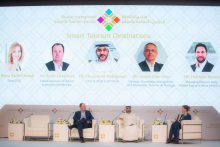 Under the theme ‘Smart Tourism and Global Challenges’, the Sharjah International Travel and Tourism Forum (SITTF) gathered entrepreneurs and experts in travel and tourism in the UAE and from around the globe, to share inspiring insights, and future plans to help recover and drive the global tourism industry in a post-COVID world.
Under the theme ‘Smart Tourism and Global Challenges’, the Sharjah International Travel and Tourism Forum (SITTF) gathered entrepreneurs and experts in travel and tourism in the UAE and from around the globe, to share inspiring insights, and future plans to help recover and drive the global tourism industry in a post-COVID world.
Held under the patronage of His Highness Sheikh Sultan bin Muhammad bin Sultan Al Qasimi, Crown Prince and Deputy Ruler of Sharjah, the Sharjah Commerce & Tourism Development Authority (SCTDA), the forum was held on November 24 at Al Jawaher Reception and Convention Centre. The event was opened by HE. Khalid Jasim Al Midfa Chairman of Sharjah Commerce & Tourism Development Authority.
“The global tourism sector is preparing for a new phase of growth where countries are employing new products and allocating deep budgets for its promotion and development. A major component to drive this growth will be the development of Smart Tourism, by immersing digital and technological innovations in this sector. In a recent study, 84% travelers themselves have stated that technology will help increase their confidence in travelling,” said Guest of Honour at the event, HE. Dr. Ahmad Belhoul Al Falasi Minister of State for Entrepreneurship and Small and Medium Enterprises. “The UAE is already employing the latest in digital technology across sectors, and in particular to support the travel sector. We have deployed the 5G connectivity, and have so far trained 100,000 programmers to support businesses. We hope to continue this drive and reach new horizons and expand to new sectors.”
He highlighted the importance of calculated and detailed development strategy in the tourism sector using digital technologies to accelerate and attract visitor experience. “We are working on ways to advance tourism initiatives. The World’s Coolest Winter Campaign attracted nearly 950,000 visitors and brought in revenues of $1bn over 45 days. We are seeing an increase in international tourism with global vaccination drives in full swing, with the Expo 2020 Dubai has welcomed 3.5million visitors in just the first six weeks. We also aim to increase UAE national participation, by encouraging more SMEs to lead the sector. There is much to look forward to in supporting the tourism industry to move forward.”
A panel discussion was moderated by Dr. Dima Rachid Jamali – Dean UOS, featuring HE Hussain Al Mahmoudi – CEO of AUSE & SRTI Park, Haitham Mattar – Managing Director, India, Middle East and Africa (IMEA), IHG, Sergio Guerreiro – Director, Knowledge Management and Innovation, Turismo de Portugal and Scott Livermore Chief Economist of Oxford Economics Middle East.
“Technology is an enabler for sustainable tourism to create more jobs. We expect to continue building on smart tourism initiatives over the next few years, aiming to see between 2-3% higher growth, as well as more than 5,000 jobs in the sector each year. With the impact of smart tourism in this region, we expect the tourism economy to grow by 8% by 2025, and be able to create 130,000 jobs,” said HE. Al Mahmoudi. He added that the government is keen on taking inspiration from Portugal in building a data hub in the UAE to share with stake holders and help leverage the tourism industry.
Titled ‘Impact of Smart Tourism Destinations on the Economy’ the panelists discussed the trends, opportunities, challenges and the future of the travel and tourism industry and technological inclusions.
Smart Tourism is a concept of using technology as an enabler to attract destinations, enhance traveler experiences, and provide a positive and sustainable impact on economies. Advantages of smart tourism bring economic, environmental and socio cultural benefits including promoting local tourism, engaging with the global audience offering customised experiences, and elevate the global touristic outlook.
Technologies such as big data, artificial intelligence, and machine learning will help advantage travel experiences for visitors with the ultimate aim for destinations to utilise local resources and improve accessibility that will in turn benefit both tourists and the country’s economy.
Experts discussed that collaboration, alongside digital transition was necessary to boost Smart Tourism. With coordinated efforts of the government, the private sector, and educational institutes a strategic road map on smart tourism can help boost tourism activity, and promote destinations in their rightful sense, creating a positive impact on the industry as a whole, as well as the economy.
The event also held individual talks by Scott Livermore – Chief Economist of Oxford Economics Middle East, who spoke on ‘Th¬e Impact of Smart Tourism Destinations on the Economy’ and Smart Tourism Destinations: Portugal Experience by Sergio Guerreiro – Director, Knowledge Management and Innovation, Turismo de Portugal.
 Tourism Breaking News
Tourism Breaking News


